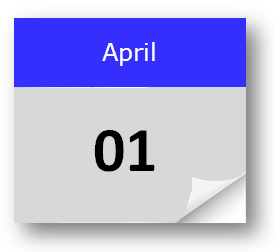The 1st of April is known as ‘April Fool’s Day’ when practical jokes are traditionally played on all. It is the 91st day of the year (Gregorian calendar) or 92nd day in a leap year.

On the 1st of April 1582
April Fools day celebrations began with the change from the Julian calendar to the Gregorian calendar in France. Most of Europe was using the Julian calendar and would celebrate the end of the year from the 25th of March until the 1st of April. The Julian calendar was introduced by Julius Caesar in 46BC and was a fairly accurate measurement of the solar year (the time taken for earth to travel to the same point in its orbit of the Sun). The Julian calendar however was slightly wrong by 0.002% as the solar year is actually 365.2425 days. This doesn’t sound like much but by 1582 the Julian calendar was out by 11 days (about 3 days every 400 years) from the observed equinox and the Catholic church was concerned that this increasing difference was pushing Easter further away from its actual date. The Gregorian calendar started to be introduced in Catholic countries of Europe in 1582 and another condition of this, as imposed by the Pope, was the change of New Year’s Day to January the 1st. In France those who had not heard the news or just continued to celebrate the New Year on the 1st of April were ridiculed and paper fish were stuck on their backs. They were referred to as "poisson d’avril" or April fish, which symbolised young fish that were naive and easy to catch. By 1700 this tradition had caught on in Britain (despite the Gregorian calendar not being introduced until 1751) with people playing tricks on their unsuspecting victims. In 1983 a history professor at Boston University proposed that the real origin came from the Roman Emperor Constantine and his jester, Kugel. Kugel had suggested that he could be a better emperor than Constantine. Amused he allowed his jester to be emperor for the day and Kugel’s first decree was that everyone had to act absurdly for the day. Many papers printed this tail only to find out that the professor was playing a prank on them.
On the 1st of April 1924
Hitler started his prison sentence in Landsberg Jail. When the German government resumed paying reparations to France and Great Britain for World War I many people in Germany were angered. This played into the hands of the Nazi party and its leader, Adolf Hitler. As support for the Nazi party grew Hitler saw an opportunity to begin an uprising against the German government. On the 3rd of November, Hitler and 2,000 Nazi members marched through Munich and into Munich Beer Hall. Hitler took over the meeting that was being held there by important Bavarian politicians and made claims that he would overthrow the German Government and with their help place them at the heart of government. On the 4th of November Hitler again began to march through Munich but they were met by armed police and the uprising was quashed. Hitler was arrested for the Act that would later be called ‘the Beer Hall Putsch’ and sentenced to 5 years in prison. Over the next few months, while in prison, Hitler wrote ‘Mein Kampf’. Due to political pressure from the growing Nazi party Hitler was released after 9 months and returned to continue his plans for Germany.